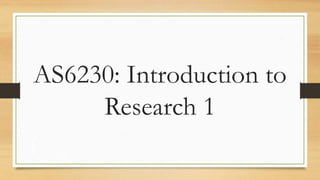
Introduction to Research Methods in the Social Services 01
- 2. Reverse Jenga Building a tower with gaps: • What are the research words you know? • What activities do you know happen in research (you don’t need to know the words)?
- 4. We are not going to go too deep yet • Research is the generation of knowledge • We are all born researchers • There are two major paradigms of research – empirical and relativistic • We are focusing on the empirical • Empirical is more than numbers, it is anything that can be observed • Researchers follow set methods and processes • All research has to be guided by a question • Research can be applied to practice
- 5. Common sense vs. academic knowledge
- 7. TPS: What is science? Who makes a scientist? How do scientists work? How does a researcher work?
- 8. What is science • Science is a particular way of studying the world • THE GOALS OF SCIENCE ARE TO: • Measure and Describe • Understand • Predict • Control E.g. To what extent can we measure, understand, predict & control postnatal depression?
- 9. THE ASSUMPTIONS OF SCIENCE AKA Ontology & Epistemology 1) ORDER • The world is lawful (ontological belief) 2) DETERMINISM • Events are determined by prior events – causality (ontological belief) 3) EMPIRICISM • The causes of events are to be found in the material, observable, world (epistemological approach) A belief in order, determinism and empiricism motivates people to search for causes Empirical Research agrees with all of the above
- 10. Research and science • Research derived 'facts' are only as good as the methodology that produces them • Science, and therefore research, is an ongoing process • No result can 'prove' a theory is correct • As we build up more support for a theory we come to have more confidence in it • Be cautious about the results of a single study (which may be flawed)
- 11. Your Turn 1) First look at the article’s headings, what do these headings tell you about research and science (IMRaD)? 2) Why would researchers have literature reviews; what is the purpose of it in an article? 3) What do the methodology sections share? 4) How are the findings sections similar and different? 5) What is the purpose of the analysis section? 6) How does research overflow into our professional practice?
- 12. Reverse Jenga Fill the gaps: • What are the research words you know now? • What new learnings have you had today about the process of research?
Editor's Notes
- Born researchers – Piaget and cognitive development – assimilation and accommodation means we constantly engage in inductive and deductive reasoning – the ways in which researchers think Empirical – knowledge can be discovered and there is truth Keeping knowledge base current in a changing social/economic/ cultural environment Enrich Your own practice Widening the knowledge of others Informing policy Evidence –based practice Evaluating programmes To educate clients Needs analysis Relativistic – knowledge is created by humans so is truth and all truth can be questioned
- ORDER The world is lawful. e.g., - water flows downhill. - people will work to get reinforcement. 2) DETERMINISM Events are determined by prior events. Causality. "things don't just happen“ 3) EMPIRICISM The causes of events are to be found in the material, observable, world. A belief in order, determinism and empiricism motivates people to search for causes. For example: what causes depression?
- Research derived 'facts' are only as good as the methodology that produces them. Science is an ongoing process. Theories and facts can get overturned. What we have is 'current best explanations' • The data 'supports' or 'fails to support' the theory. • No result can 'prove' a theory is correct. • We obtain data that is consistent with our theory ( or not consistent). • As we build up more support for a theory we come to have more confidence in it. • Scientific theories are challenged by competing scientific theories. • Be cautious about the results of a single study (which may be flawed). • Patterns of results are more convincing.
- Research derived 'facts' are only as good as the methodology that produces them. Science is an ongoing process. Theories and facts can get overturned. What we have is 'current best explanations' • The data 'supports' or 'fails to support' the theory. • No result can 'prove' a theory is correct. • We obtain data that is consistent with our theory ( or not consistent). • As we build up more support for a theory we come to have more confidence in it. • Scientific theories are challenged by competing scientific theories. • Be cautious about the results of a single study (which may be flawed). • Patterns of results are more convincing.